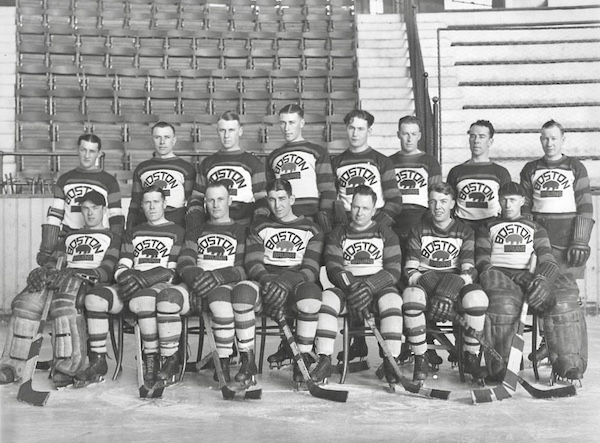
By: Steve McClure | Follow me on Twitter/X @stmcclure1993
On this date in 1929, the Boston Bruins won their first National Hockey League title, sweeping the defending champion New York Rangers in two games.
The Bruins and Rangers were embroiled in a 1-1 deadlock until center Bill ‘Doc’ Carson, a Toronto dentist in the off-season, scored with 1:58 left in regulation, disappointing the Madison Square Garden faithful and earning the Boston Bruins their first Stanley Cup title for owner Charley Adams, who had five years earlier secured the franchise for a paltry $15,000.
The Boston hockey club had soundly swept the Montreal Canadiens in the prior semifinal round thanks to two ‘Tiny’ Thompson shutouts, both by razor-thin 1-0 scores, and a 3-2 Game three win, which saw the Bruins erase an early 2-0 deficit thanks to goals by center Bill Carson, left-wing Dutch Gainor, and stalwart defenseman Eddie Shore—all scored over the course of 5:13 in the second frame. Shore had earlier assisted on the Carson goal. According to Boston Globe writer John J. Hallahan, the three-game sweep of Montreal caused a “shock to the hockey foundation of the dominion of Canada.”
The Rangers, determined to win back-to-back titles, had earned the right to challenge the Bruins after a two-game sweep of the Toronto Maple Leafs. Coached by legendary NHL luminary Lester Patrick, the stout New York team was led by future Hall of Fame forwards Frank Boucher, Bill and Bun Cook, as well as burly defenseman Ivan ‘Ching’ Johnson.
Boston’s ice hockey team had previously gained a 1-0′ best of three’ series advantage over the Rangers after Cecil “Tiny” Thompson, the heralded rookie netminder, backboned a 2-0 shutout victory at Boston Garden. Dit Clapper and Dutch Gainor both scored unassisted goals to lead the offense in the opener. The contentious tone of the series opener seemed to be established by captain Lionel Hitchman, who was assessed three separate ‘roughing’ penalties, and Eddie Shore, who was cited for two ‘roughing’ incidents himself.
The series shifted to New York’s Madison Square Garden for game two, where the Rangers were undefeated and unscored upon in the ’29 playoffs. However, Boston right-winger Harry ‘Pee Wee’ Oliver’s strike at 14:01 of the second period put an end to that string; and after NY left-winger Butch Keeling had resurrected hope early in the second with his 3rd goal of the ’29 playoffs, Oliver assisted again on Carson’s late game goal, dashing those MSG hopes and ultimately giving Boston its first taste from the Cup.
Just as it is today, Lord Stanley’s silver is presented to the winning team by the NHL league president; after the win, President Frank Calder presented the trophy to captain and premier defenseman Lionel Hitchman, whose retired #3 hangs proudly from the Boston Garden rafters. The Stanley Cup had to undergo one of its many growth spurts after the Bruins win; in fact, there was not enough room on the remaining Cup ring to add all members of the ’29 squad. It wasn’t until the 1957-58 season that the Cup was reconfigured to include six more names.
In a move that would portend future hockey bitterness toward Boston, a Vancouver newspaper, The Province, presumably jealous of an American city’s success in their game, proclaimed the following in an editorial headline: “Players imported from Canada won the Stanley Cup for Boston.”
Unlike today’s city parades, duck boat rides, and media frenzy, the Bruins’ first NHL championship was celebrated in a relatively understated manner. Days after taking the title from the Rangers, the team gathered for a banquet at the hub of the social elite—the Copley Plaza Hotel’s ‘Swiss Room.’ Reportedly, each player received a $2,000 playoff share (equal to roughly $36,000 today) as well as a $500 bonus reward from owner Adams. Ross even chipped in to provide his Bruins brethren with individual championship diamond rings.
Ross purportedly toasted the team at the 1929 celebration, declaring, “I’m proud of the boys. They’ve stood by me splendidly.” In retrospect, the toast was a victorious, time-stamped moment of merriment—hanging paradoxically amid roaring twenties excesses and Prohibition-era sway—and which would only months later pirouette toward Depression-era gloominess. One can imagine the faint piano chords of “Ain’t Misbehaving” chiming from somewhere outside the banquet hall as Ross added—perhaps with a wink of the eye—”Do you know not one of them has had a glass of beer since November?”
Let’s raise a celebratory glass to the 1928-29 Stanley Cup champion Boston Bruins!
(Copley Plaza Hotel and Province tidbits credited to an article in The New York Times on June 10, 2019, under the headline “When the Boston Bruins Won Their First Stanley Cup. Twice.”)


Leave a Reply